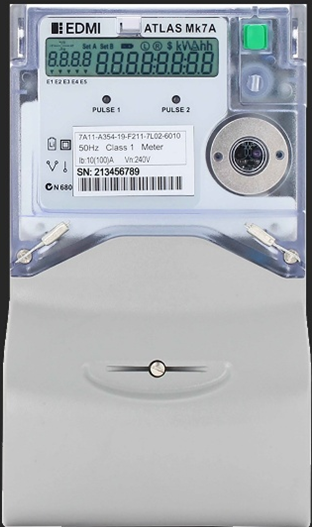What is a smart meter?
Smart meters are two-way digital meters that measure and record electricity usage (per kWh) every 5-30 minutes and transmit this data to your energy retailer via a telecommunications network.
What does a smart meter look like?
A smart meter is a compact, rectangular device with a digital screen. They come in various types and models. If your electricity meter has a digital screen, no dials, and resembles the image below, it’s most likely a smart meter.

Advantages of having a Smart meter:
Lower Fees and Charges
Smart meters transmit data digitally to your electricity retailer, removing the need for manual meter readings, unless you or your distributor have set your smart meter to manual reads.
They can also make moving house easier and more cost-effective. Because smart meters can be connected or disconnected remotely, there’s no need to wait and pay fees for a technician to visit your property, helping you avoid the additional costs usually associated with site visits.
Accurate, Transparent, and Reliable
Smart meters provide accurate and transparent billing by automatically sending timely usage data to your retailer, reducing reliance on estimated reads and ensuring more frequent, reliable updates on your account.
In the event of a power outage, smart meters can instantly alert your electricity distributor—leading to faster response times and repairs.
Flexible Pricing and Monthly Billing
Smart meters allow for time-of-use pricing. This means you can choose a plan with different rates depending on the time of day, helping you save by using less energy during peak times.
Traditional electricity meters are usually read quarterly. Smart meters provide more frequent data, making accurate monthly billing possible.
Smart meter data can help you identify your usage pattern between the peak and off-peak times, and which appliances use more energy.
The appliances you should consider shifting to off-peak times are those which use lots of energy and do not need to be on all the time, such as:
Washing machines
Dryers
Dishwashers
Hot water heaters (often set to operate during off-peak time)
Pool pumps
Ready for Solar, Batteries or EV vehicles
A smart meter is required if you want to install solar panels, batteries or EV installations.
Installation Costs
In most situations, if we’re replacing your existing meter with a smart one, there will be no upfront cost to you.
However, in some instances—after an inspection by our meter technician—you may be required to carry out remedial work at your own expense (or your landlord’s) to make sure the site is safe, accessible, and ready for the new meter installation.
Do I have to get a smart meter?
Yes. Under the AEMC’s rule on accelerating smart meter deployment, all basic and analogue meters in the National Electricity Market will be replaced with smart meters by 2030.
You will also be required to have a smart meter installed sooner in certain circumstances, including:
- Faulty meter
- New electricity connection
- Alteration (i.e. renovations, installation upgrades)
- Installing solar panels, batteries and EVs
Can I opt-out of getting a Smart Meter?
No. From 1 June 2025, you no longer have the option to opt out of having a smart meter installed.
However, you can request that the smart meter’s wireless communications be disabled. If you choose this option:
- Your meter will need to be read manually by a technician, and a fee may apply for each manual read.
- While smart meters collect interval data, without wireless communication the data cannot be transmitted. Your bills may be based on estimates until the meter data can be downloaded.
- It’s important to note that smart meters do not display cumulative usage, so if you receive an estimated bill, you may not be able to provide self-reads in the same way as with older meters.
Before deciding to disable the wireless function, speak to us about the potential costs and how this could affect your billing.
Are smart meters safe?
Yes. Smart meters meet strict Australian safety standards
Can smart meters cause any health issues?
There is no established scientific evidence to support that exposure to the low-level RF EME from smart meters causes any health effects. For more information, visit:
https://www.arpansa.gov.au/understanding-radiation/radiation-sources/more-radiation-sources/smart-meters
How can I access information from my smart meter?
Currently you can contact Sumo directly for your detailed usage and we can supply the interval data via email. Call our team on 13 88 60, Mon – Friday 9am – 4.30pm.
Do I have a smart meter – Victoria?
99.6% of households in Victoria have smart meters already installed by their distributor, following a mandatory rollout completed in 2014.